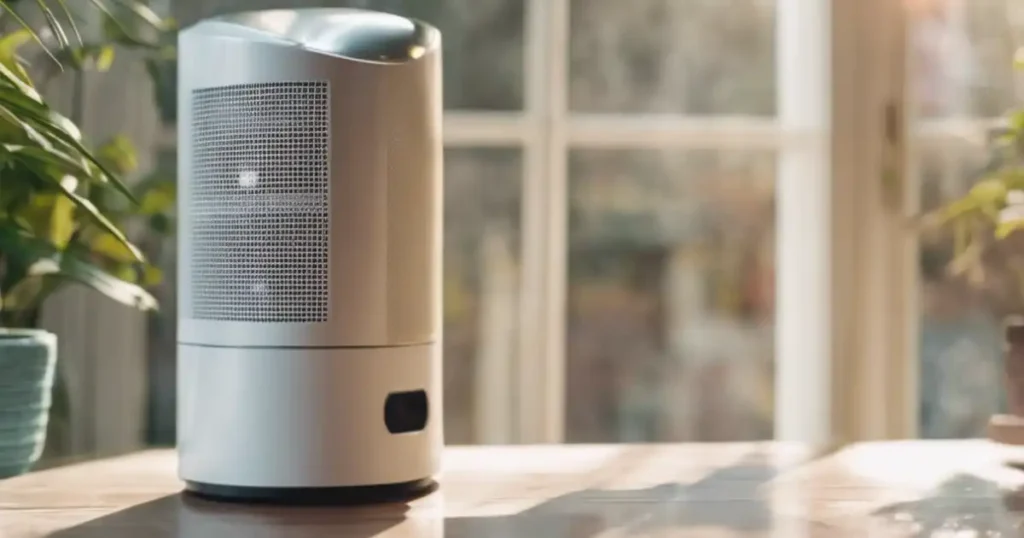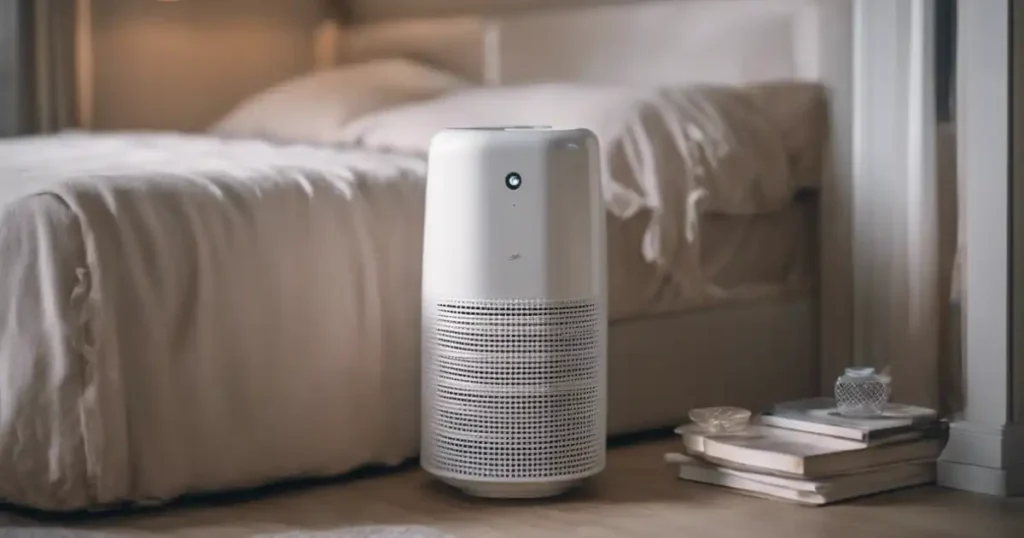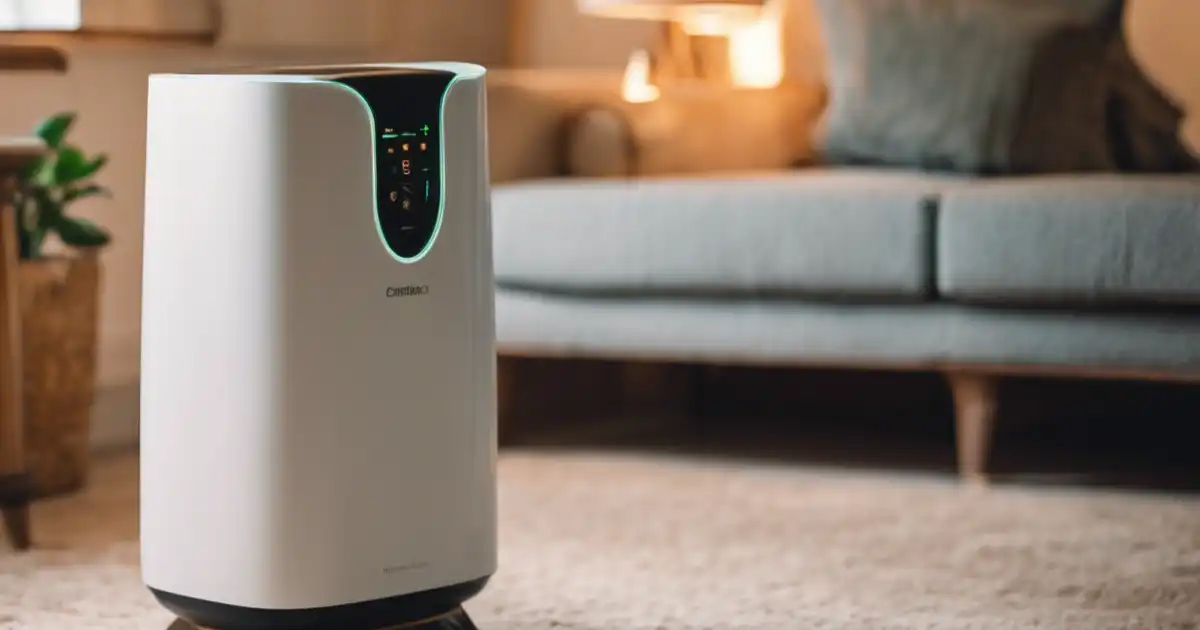Taking a deep breath of fresh, clean air when you enter a room is one of life’s best pleasures. But what if you get a whiff of something unpleasant emanating from your air purifier instead of that cool, refreshing feeling? You immediately ask yourself, why is my air purifier smelling bad?
Air purifiers may emit unpleasant odors due to overheating, mold growth, or electrical faults. If your purifier emits a persistent bad smell, address it immediately to maintain optimal performance.
Keep reading to explore the most common smells that your purifier may emit. We’ll uncover what causes them and how to eliminate them for good. We’ll also share maintenance tips to ensure your air cleaning device stays fresh and odor-free in the long run.
Why Does My Air Purifier Smell Bad?
When something goes wrong, several distinct odors can emanate from a purifier’s vents. Here are the most prevalent funky air purifier smells and what they typically signal:
1. Smell Like Plastic
There are primarily two reasons why your air purifier may emit a plastic-like smell. The initial plastic odor is a common experience with new air purifiers as the device settles in. It should gradually fade away as the purifier gets used to its normal operation.
But if the plastic smell continues or gets really strong, it usually indicates that some internal part is overheating. This can happen if filters are clogged or the device is dusty, preventing proper airflow. As components heat up from working too hard, plastic or rubber materials start to release toxic fumes.
Solution:
- Turn off and unplug the unit and allow it to fully cool down.
- Clean or replace pre and HEPA filters if they are visibly dirty or clogged.
- Use a vacuum with a soft brush to gently remove dust and pet hair buildup from the purifier’s exterior and interior air intake.
- Ensure that your air purifier’s air flow isn’t blocked by anything.
- Turn it back on and see if the smell persists. If it returns after a short time, the motor or internal fan likely needs service or replacement.
2. Smell Like Wet Dog
If your air purifier smells like a wet dog, it’s probably because there’s mold or mildew growing inside the unit. This tends to happen when moisture in the filtered air allows excess condensation to form and germs to grow. A wet dog smell usually means you have an internal microbial contamination issue. This not only compromises the air quality but also poses potential health risks.
Solution:
- Carefully clean the device’s interior with a disinfectant solution for mold removal.
- Pay special attention to condensation-prone areas and thoroughly scrub visible film or grime away.
- Let all parts dry fully before reassembling.
- Regularly check and wipe out condensation from chambers inside the purifier. If the wet fur smell returns quickly, consider replacing the unit.
3. Smell Like Burning
A strong burning odor indicates a serious problem that requires immediate attention. When your air purifier emits a burning smell, it is often caused by an electrical fault. This could include a burnt UV light, damaged wiring, or a short circuit. These issues cause internal components to overheat, giving rise to a distinctive odor that should never be ignored.
Solution:
- As with any electronics emitting smoke or burning smells, unplug the unit immediately.
- Do not attempt to turn it on again until a qualified technician inspects for the source of the electrical malfunction.
- Repair or replacement of the faulty components will be necessary to operate the device safely again.
- Make sure to mention any recent electrical surges as well in case they contributed to the issue.
4. Smell Like Bleach or Chlorine
If your air purifier starts to smell like bleach or chlorine, the most likely reason is that it uses a technology involving ozone. Ozone-generating purifiers produce ozone into the air to neutralize odors. This process can occasionally lead to a bleach-like or chlorine odor. Excess ozone exposure causes respiratory irritation and should be addressed promptly.
Solution:
- Turn off and unplug the air purifier.
- Open windows for at least a half hour to ensure a continuous flow of fresh air in your home.
- Have a technician service the purifier.
- Considering the health hazards associated with ozone, avoiding using a purifier that generates ozone is advisable.
- Instead, consider choosing a different type of air purifier that does not produce ozone for a safer and odor-free environment.
5. Dusty Smell
If your air purifier emits a musty or dusty smell, it indicates the presence of dust debris and buildup in neglected areas of the purification system. Insufficient filter changes or infrequent cleanings allow organic matter to accumulate, releasing stale odors. These eventually circulate through the vents instead of fresher air.
Solution:
- Conduct a thorough cleaning of the entire air purifier, including all chambers and filters, from top to bottom.
- Use disinfecting wipes or vacuum attachments for tight spaces to remove fine particles.
- Schedule regular reminders to replace the filters as per the manufacturer’s recommendations, typically every 3-6 months.
6. Sweet Smell
If you’ve just brought home a brand-new air purifier and caught a whiff of a sweet smell, don’t fret—it’s a common occurrence with new devices and nothing to be concerned about. However, if that sweet scent lingers longer than expected, it might be signaling that it’s time to consider replacing the activated carbon filter.
Solution:
- Simply replace the activated carbon filter if the sweet smell persists longer than expected.
- This ensures your air purifier continues to operate effectively, maintaining a fresh and clean environment.
Are Air Purifiers Supposed to Smell?

This is a common question many people have. The short answer is no. Air purifiers are designed to filter out smells, not create new ones.
When operating normally, air purifying devices should not emit any odors of their own. They draw in unpleasant odors, particles, and gasses, capturing them in the filters, and then circulate clean air back out.
So if you detect plastic, wet dog, chlorine, or burning smells coming from your air purifier, something is likely going wrong. It means pollutants and compounds are building up faster than getting filtered out.
Air that smells bad coming out of an air purifying unit, especially when in constant use, indicates overdue maintenance. Clogged filters, high operating heat degrading parts, and accumulated residue could all be culprits.
The goal is neutral or no scent at all from clean air coming out of a purifier doing its job. Strange smells mean it’s time to troubleshoot so you can go back to breathing easily!
Do air purifiers make the air smell good?
Air purifiers with activated carbon filters can effectively remove unpleasant odors and make the air in your home smell fresh and pleasant. The porous structure of activated carbon acts like a sponge, trapping a wide range of odorous gasses, fumes, and volatile organic compounds (VOCs) as air passes through. This helps eliminate smelly contaminants emitted from sources like cooking, pets, cigarettes, and mold.
Without lingering bad smells, an activated carbon filter allows a purifier to freshen room air. It helps restore a clean scent that people describe as light, neutral, or refreshing. Some compare it to the pleasant smell after a rainfall.
So, while the primary role of an air purifier is to remove pollutants, the activated carbon filtration it uses also rids bad odors. And air that is free of smelly chemicals naturally smells more inviting. Just keep in mind that filters need to be changed regularly to maintain this benefit as the carbon gets clogged. When used properly, a purifier can transform stinky indoor air into fresh and pleasant-smelling air.
Maintenance Tips for Odor-Free Air Purifiers

To prevent unwanted smells and keep your air purifier working efficiently, be sure to incorporate these key maintenance practices:
- Regular Filter Replacement: Filter replacement is crucial. As soon as indicator lights prompt you or every 6-12 months, swap old filters out for new ones. Clogged, older filters are less effective and can emit foul odors.
- Clean the Interior: Every 1-2 months, carefully inspect the inner workings, fans, vents, ducts, and motors for any dust and debris accumulation. Use a small vacuum attachment to gently suck out clingy particles starting to form hard-to-reach bunnies and clusters. if your air purifier comes with a washable filter, remove the filter and wash it gently.
- Exterior Cleaning: Dust and pet hair can accumulate on the exterior of the purifier, affecting its performance. Use a soft brush attachment vacuum to gently remove debris from the exterior and interior air intake.
- Check for Blockages: Ensure that nothing is blocking the airflow around the air purifier. Adequate airflow is crucial for proper operation, and blockages can lead to overheating and unpleasant odors.
- Address Ozone Concerns: Avoid ozone-generating models. Ozone-releasing purifiers make chlorine-like odors. The ozone can pose severe health risks, including respiratory issues and eye and throat irritation.
- Monitor for Burning Smells: A strong burning odor indicates a serious issue, such as an electrical fault. If you detect a burning smell, immediately unplug the unit and have it inspected by a qualified technician. Do not attempt to use it until the issue is resolved.
- Replace Activated Carbon Filters: If you notice a sweet smell that persists longer than expected, replace the activated carbon filter. This ensures the effectiveness of the air purifier in eliminating odors.
- Ventilation: Allow the room to ventilate after cleaning or servicing the purifier. Open windows and doors to let fresh air circulate and remove any lingering odors. Poor ventilation can contribute to lingering odors, so it’s crucial to address this concern.
- Regular Check-ups: Periodically inspect the purifier for signs of wear and tear. If you notice any issues, address them promptly to ensure the purifier is working optimally and maintaining a fresh indoor environment.
Conclusion
Maintaining a fresh and odor-free environment with your air purifier requires regular attention and care. The distinct smells emitted by purifiers, such as plastic, wet dog, burning, bleach or chlorine, and even sweet scents, signal potential issues that need addressing.
Recognizing the cause of these odors and implementing appropriate solutions is crucial for the device’s effective operation and well-being. Air purifiers, designed to eliminate unpleasant odors, should not create new ones when operating normally.
The goal is to achieve neutral or no scent at all from clean air circulating back into the room. By following the provided maintenance tips, you can ensure that your purifier continues to transform indoor air into a fresh and pleasant-smelling environment.
FAQs
Why does my air purifier smell sour?
If your air purifier smells sour, it may indicate microbial contamination from excess condensation fostering mold or mildew growth inside the unit. Regular maintenance is key to preventing the return of the sour smell.
Why does my air purifier smell like ozone?
Ozone smell emitted from your purifier indicates that it uses ozone-generating technology. Ozone release is intended to neutralize odors, but an excess can lead to a bleach-like or chlorine smell. As mentioned earlier, Considering the potential health risks of ozone exposure, you may want to consider switching to an ozone-free purifier.
Why does my air purifier smell like burning?
If your air purifier emits a burning smell, it’s often due to an electrical fault. This could include a failed fan motor, damaged wiring, or a short circuit. These issues cause internal components to overheat, creating a distinctive odor. As mentioned earlier, unplug the unit immediately, refrain from turning it on, and seek a qualified technician for safe operation.
What does a dirty air filter smell like?
A dirty air filter can emit a musty or dusty smell. Inadequate filter replacement or infrequent cleaning can result in organic matter build-up. This buildup may release stale odors into the air. Regular cleaning and timely filter replacements are essential to prevent and eliminate such smells from your air purifier.
What happens if you don’t clean the air purifier?
Neglecting to clean your purifier can lead to various problems. Accumulation of dust and debris in neglected areas of the purification system can result in a dirty or musty odor from the device. Inadequate maintenance can also compromise the effectiveness of filters. This allows pollutants to collect and circulate through the vents instead of fresh air.

